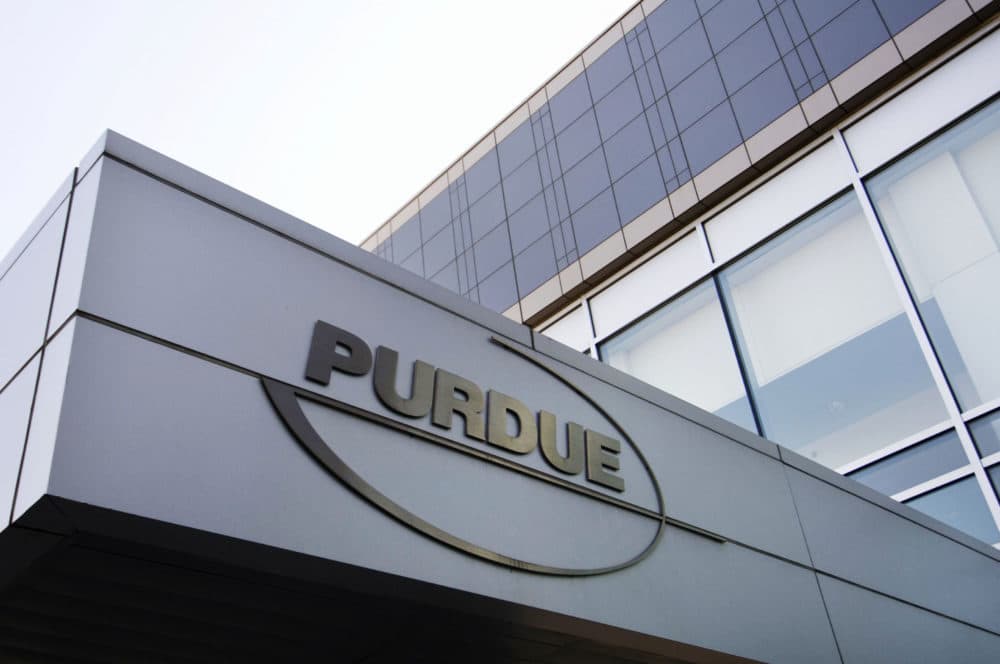Advertisement
The Mass. Ties In Healey's Complaint Blasting The Sackler Family And Purdue Pharma

New documents from a complaint filed by Massachusetts Attorney General Maura Healey allege that Purdue Pharma and its owners aggressively promoted the company's opioid painkiller, OxyContin, even though they knew it was dangerous.
The complaint is the first to name individual members of the Sackler family, Purdue's owners, as well some Purdue board members. (The defendants are 17 people and two Purdue companies.) It says since May 2007, Purdue has sold more than 70 million doses of opioids in Massachusetts for more than $500 million.
Purdue calls the allegations "sensational" and "irresponsible" and says Healey's complaint distorts the facts. In a statement, the company said that Massachusetts "cherry picked " information to bolster inflammatory allegations and that the state used confidential documents to embarrass the company and its officers.
Healey's complaint outlines Purdue's work with local institutions and some of the defendants' local ties. Here is a list of some of them:
Massachusetts General Hospital
Healey's complaint says the Sacklers voted to continue funding the MGH Purdue Pharma Pain Program and paid MGH $3 million, which the complaint alleges contributed to the deceptive promotion of opioids. It also says Purdue planned a symposium at MGH and prepared the guest list so it included “key politicians” and managed care administrators, who decide insurance coverage for Purdue meds.
When asked to comment, MGH emailed a Boston Globe letter to the editor that it said was still relevant. It was written by Dr. Warren Zapol in 2002, shortly after Purdue launched its program at MGH. The letter says: "The agreement between the MGH and Purdue Pharma in no way allows the company to design medical seminars or materials focused on treating pain." It also says "the implication that the educational curriculum will be designed in some inappropriate manner to encourage physicians to prescribe OxyContin is simply wrong."
Tufts University
The complaint alleges that the Sacklers supported a master's program they started at Tufts School of Medicine called the Pain Research, Education and Policy Program. Healey's memo says this program was such a success for Purdue that it wanted it to serve as model for influencing other teaching hospitals and medical schools around the nation. It's alleged that Purdue regularly sent staff to Tufts and Tufts in 2011 promoted a Purdue employee to adjunct associate professor.
Tufts declined to comment.
Richard Sackler
The complaint alleges that Sackler was among those who directed Purdue sales reps to go door-to-door in Massachusetts to implement the deceptive scheme of promoting drugs they knew were dangerous. It also says Sackler helped direct payments to Massachusetts doctors to promote Purdue drugs and targeted funding and programming to deceptively promote opioids at local medical institutions, including Tufts and MGH.
The complaint lists Sackler's ties, including his work on the Board of Advisors at Tufts, and his investment in a privately held biotech company in Boston.
Russell Gasdia
Gasdia lives in Massachusetts and is a former Purdue vice president of sales and marketing. Gasdia is accused of traveling around the state to promote dangerous opioids. The complaint says Richard Sackler directed Gasdia to boost sales in Massachusetts by hiring reps who focused on higher-dose and longer-term prescriptions. The complaint says Gasdia carried out the Sacklers' plan to grow Purdue's opioid sales by adding sales reps and increasing their visits to doctors. Gasdia is accused of helping to instruct sales reps to focus on patients who had never been on opioids — even though they posed an increased risk for addiction. The complaint also says Purdue tried to conceal its deception by avoiding a paper trail, and Gasdia ordered the firing of a sales rep who wrote down her sales pitch in an email.
Judith Lewent
Lewent was a Purdue board member accused of knowingly advancing the Sacklers' plan to promote a dangerous drug. Lewent is a lifetime member of the governing board of The MIT Corporation. The complaint also says she is a director of a "significant company," which it does not name. Her address is listed in Waltham. The complaint also says she is a member of an academy headquartered in the state.
Cecil Pickett
Pickett is a Purdue board member who formerly worked at Biogen IDEC and lived in Cambridge. The complaint says Pickett is a director of another company in Massachusetts.
Ralph Snyderman
Snyderman was a Purdue board member who co-founded a health care company in Newton. The complaint cites his reports to the government about his compensation as a Purdue board member and, for instance, he was paid more than $124,000 in 2016.
The complaint says in exchange for money, Lewent, Pickett and Snyderman "did what the Sacklers wanted every step of the way."
This segment aired on January 16, 2019.
